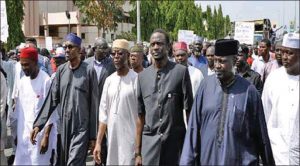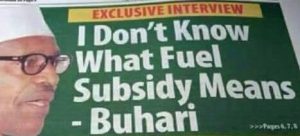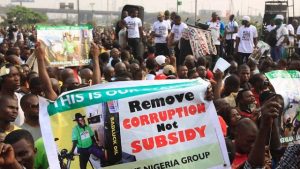So, how might we understand why there is no street action against President Buhari in 2020 for the same hike in fuel price that former President Goodluck Jonathan was roasted in the first truly nationwide mass protest in contemporary Nigeria in January 2012?

The image of Buhari as a protester!
This is a question around which there is no likelihood of a consensus in Nigeria of today split along diverse tendencies and fault lines. The very likely answers if the question were thrown open would be Buhari being a Muslim, Buhari being a Northerner, Buhari being a more entrenched person in the Nigerian establishment than Goodluck Jonathan who is a system outsider. Perhaps, someone would mention generational divide – Goodluck being much younger than Buhari. It is also likely some people would say it was because Nigeria had just gotten damned too tired with PDP and the 2012 protest was the first signal.
As is the case with this sort of debate, no answer can be dismissed. It all depends on what evidence a debater adduces to demonstrate his or their standpoint.
However, the person or group that argues that Buhari is escaping with the same murder for which Goodluck was punished because, unlike in the case of Buhari, there was an opposition desperate to take over from the PDP which Goodluck Jonathan symbolised would most likely score higher. That point would be striking because it wasn’t just that Nigerians were tired with the PDP at the time, it was also that there was a political force that could, somehow, innovate, cooperate, facilitate and assist the 2012 protest.
 It was so successful then President Jonathan cried out, saying it was beyond protest against fuel price hike. He and his security team read a ‘regime change’ agenda to it and successfully got the Nigeria Labour Congress, (NLC) that had assumed leadership of the protest to back down. With that, the protest ended as swiftly as it had started. But, things were never the same again for the Goodluck regime as the protests assumed other forms, including protest walks by APC leaders in which Buhari himself participated.
It was so successful then President Jonathan cried out, saying it was beyond protest against fuel price hike. He and his security team read a ‘regime change’ agenda to it and successfully got the Nigeria Labour Congress, (NLC) that had assumed leadership of the protest to back down. With that, the protest ended as swiftly as it had started. But, things were never the same again for the Goodluck regime as the protests assumed other forms, including protest walks by APC leaders in which Buhari himself participated.
The paradox today is that there have been no such protests against President Buhari. That is contrary to the question that he, President Buhari, would have asked. He has always wondered why “society displays little opposition against wrong policies” as he did while delivering the Fourth Sir Ahmadu Bello Memorial Lecture in May 1998.
Although he asked that question before he became a partisan, nothing has changed as for the question to have become irrelevant. In 1998 when he posed the question, his answer was this: “Part of the answer is the grinding poverty which occupies people’s attention and allows them little time for the luxury of concern in bringing about changes. Individuals are busy trying to engineer one square meal a day”.

Too poor to protest?
If he is correct, then it stands to reason that he is implicated in the dearth of popular protests against him through use of mass impoverishment. But, was he correct in assuming that what he himself called ‘unbelievable passiveness’ of the populace in that same address is accounted for by the strategy of mass impoverishment? He could only have been partially correct. Poverty itself does not stop people from imbibing the culture of popular protest. It could actually trigger the culture of protest action in them and that is what the world has seen more than the other way round.
A more brilliant answer would thus be the lack of political forces organised enough to capture popular disaffection and lead such protests. The PDP is not yet that opposition because it has no star performers by which to signal to the people that it has overcome its past. The radicals have not even constructed a binding paradigm of Nigeria, much less sell anything to anybody as to be an alternative. The ethnic platforms canvassing restructuring or true federalism are selling messages that have been largely understood as part of politics of dismembering the country. Above all, the messages are contradictory of popular experiences. It is not clear if its proponents have listened to the traders involved in the trading networks in garri, palm oil, yams, fish and so on and which networks do not follow the logic of restructuring as presently understood. It is not surprising President Buhari is so lucky.




























